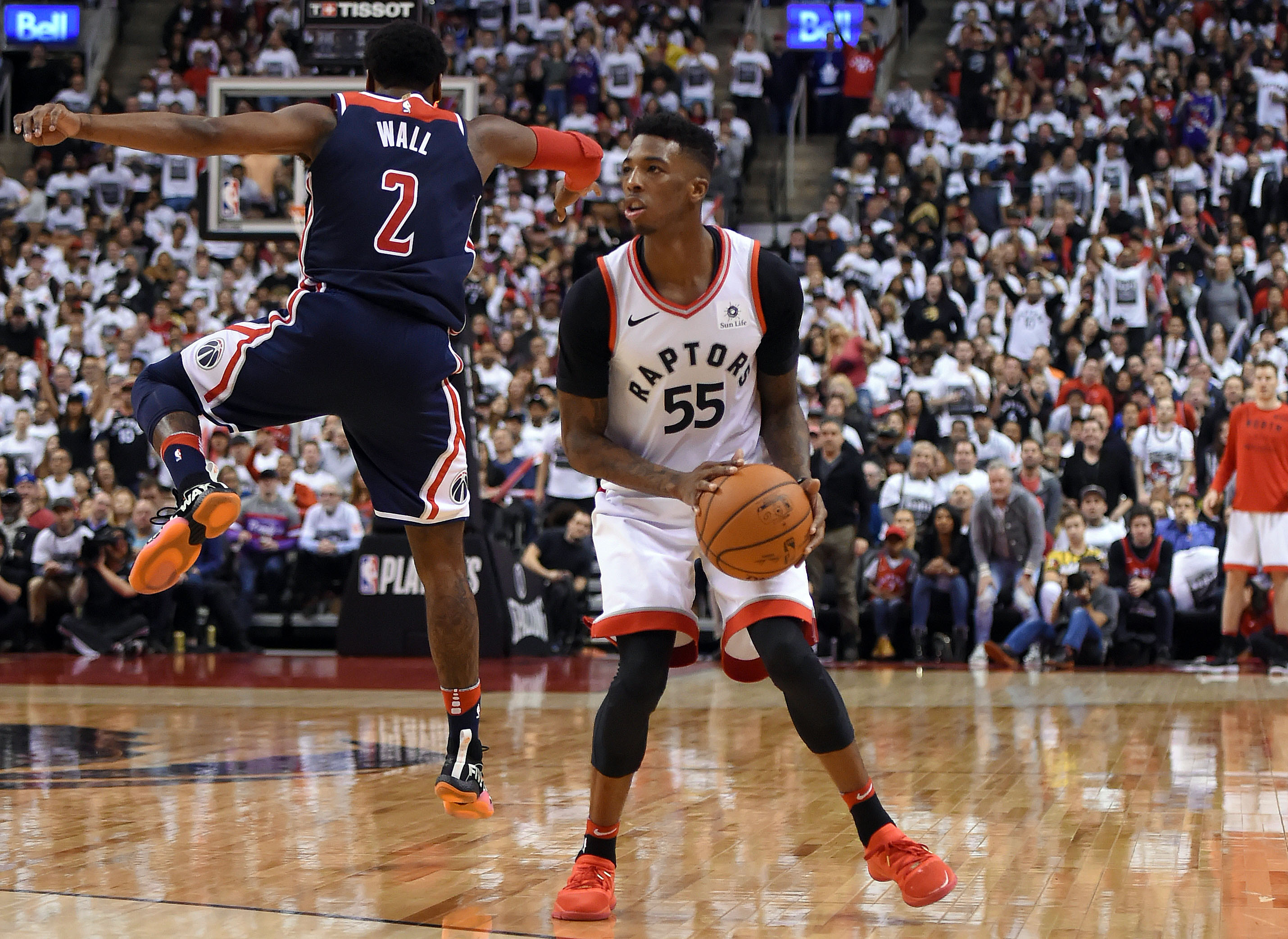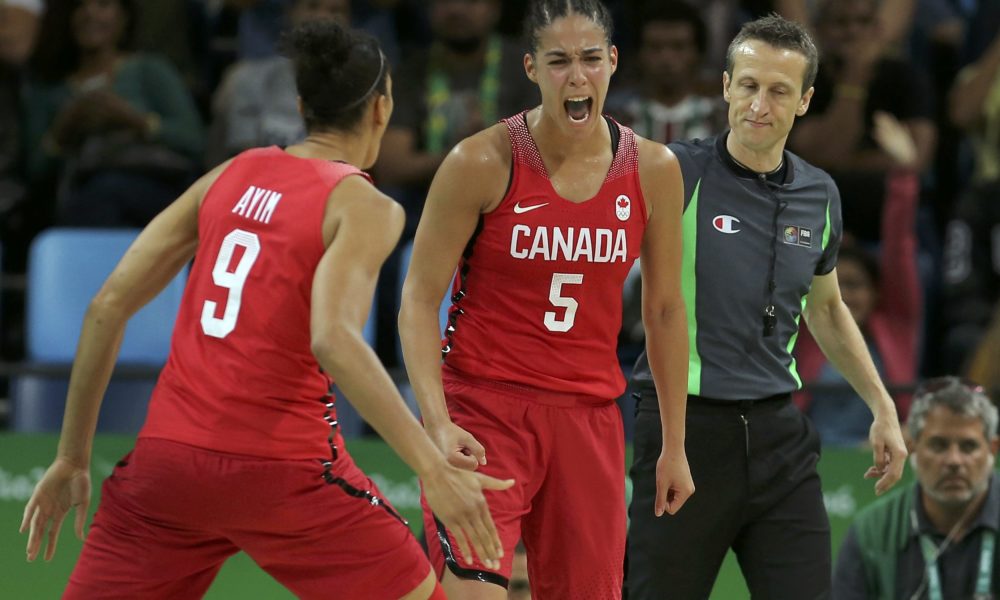You can keep up with all of our player reviews here.
When a season ends as painfully as the 2017-18 season did for the Toronto Raptors, it’s easy to give up and suggest a total rebuild without taking into account what President of Basketball Operations Masai Ujiri has worked hard to build in Toronto. Regardless of how you feel about his contract extensions or new coaching hire, Ujiri has proven himself adept at drafting and developing non-lottery talent while remaining competitive. One of those non-lottery talents, Delon Wright, is entering a contract year coming off his best season to date. Wright is not indispensable, nor does he have MVP potential, but as a prototypically versatile modern NBA point guard who is as unselfish as he is unfinished, Delon Wright is the embodiment of Ujiri’s Raptors.
Wright, a 26-year-old drafted 20th overall out of the University of Utah in 2015, is an ideal guard in the modern, semi-positionless, switch-happy NBA. At 6-foot-5, 183 pounds with a 6-foot-7.5 wingspan, Wright is a long and athletic guard capable of matching up against most players on the opposing team, something that will come much easier to him once he adds more muscle to his lean build and gets in more reps as an NBA defender. In addition to his combination of size and speed, Wright has everything you look for in a modern NBA point guard: An advanced ability to finish at the rim, an improving three-point shot, the ability to rebound in traffic and get out quickly in transition, and the skill to distribute the ball.
Although largely overshadowed by fellow point guards Kyle Lowry and Fred VanVleet last season, Wright had by far his best campaign in 2017-18, averaging 20.8 minutes, 2.9 rebounds, 2.9 assists, and 8.0 points on 46.5 percent shooting in 69 games; all of which were career-highs. Wright’s season was overlooked not just because he played under an all-star in Lowry and an undrafted sensation turned fan-favourite in VanVleet, but also because Wright’s game isn’t necessarily supposed to stand out. In fact, Wright’s game is inherently smooth and subtle because he is for the most part good but not great in every aspect of basketball. It’s what makes him so overlooked yet so impactful at the same time. It’s also what makes him so versatile.
The first two years of Wright’s tenure with the Raptors were largely developmental, with Wright splitting time between the G-League and the NBA where he played behind two veteran point guards in Cory Joseph and Lowry. When Joseph was traded to Indiana in the offseason, the idea was that Wright would get his chance to lead the second unit and show what he is truly capable of. Wright never got that chance, though, due to the emergence of undrafted point guard Fred VanVleet, who stole the final Raptors roster spot in Summer League and never looked back, eventually running the Raptors bench to a historically great season. Wright was an instrumental part of that bench, sharing distribution and scoring duties with VanVleet, but it was hard not to wonder what he would be capable of given a bigger share of the offense. When VanVleet went down with a shoulder injury in the first round of the playoffs, we got a glimpse of that potential as Wright got the chance to run the second unit in addition to playing crunch-time minutes guarding Wizards all-star point guard John Wall. He excelled doing both.
https://www.youtube.com/watch?v=9v0ofWXV51U
Dwane Wade, one of Wright’s basketball heros growing up, sees the untapped potential in Wright’s game.
“I like his game. As he gets more opportunities to play, he’ll get more confident on the floor with guys,” Wade says. “Right now, I think he’s playing the role he needs to play. He definitely has more to his game, but it all comes with more opportunity and more confidence… Right now he’s playing the role they need him to play. That’s what you’re supposed to do when you play a team sport.”
Wright entered the NBA with major questions about his jumper, which is why he fell to 20th in the draft. He shot 29.9 percent from three on 1.9 attempts per game in two seasons at Utah, and he attempted only 43 threes in his first two seasons in Toronto. As he became more comfortable at the NBA level, and as the Raptors offense transitioned to shooting more threes, Wright’s jump shot continued to improve. During the regular season, Wright shot 36.6 percent on 2.2 three-point attempts per game, and when the stakes were raised during the playoffs, he shot an improved 42.9 percent from three. Developing a consistent three point shot will be crucial in determining how good Wright can be at the NBA level, because if he is able to develop a consistent three-pointer in addition to his size and all-around skill, he will prove versatile enough to fit into any system. As Jonathan Tjarks writes, “Wright could function like George Hill: alternating between spotting up and running pick-and-rolls and filling in wherever necessary on defense.” As the Raptors look to get away from iso-ball in favour of heavy ball-movement through multiple playmakers, that kind of versatility is not only welcomed, but necessary.
That versatility allowed the Raptors to play Wright alongside another point guard throughout last season, and the team excelled playing him on the wing. In the 775 minutes Wright shared the floor with VanVleet during the regular season, the Raptors outscored opponents by 15.6 points per 100 possessions while distributing 6.5 more assists than their opponents. In the 372 minutes Wright shared the floor with Lowry, the Raptors outscored opponents by 7.3 points per 100 possessions and while distributing 2.7 more assists than their opponents. In the modern NBA it is extremely valuable to find combo guards that can play both on the ball and off it, and if Wright continues his development as a shooter he will be able to do just that regardless of who he shares the floor with.
Speaking of who Wright shares the floor with, it’s unclear what the Raptors point guard situation will be like next season. Although Wright is a nice trade chip, especially if the Raptors want to avoid paying him when his contract expires after next season, the organization spent time and resources developing him over the last three years and it is unlikely they would want to part ways with their most versatile point guard who is still improving. More likely, though, is the possibility of the Raptors moving on from VanVleet, who is a restricted free agent potentially demanding more money than the Raptors are able to afford. If that’s the case, Wright will likely get the chance he’s been waiting for to run the offense when Lowry and DeRozan sit and potentially even close out games with the Raptors best.
Furthermore, new head coach Nick Nurse might be able to get more out of role players like Wright regardless of what happens with VanVleet in the offseason. Nurse has shown an interest in playing a more democratic style that utilizes several playmakers to generate ball movement resulting in three point shots. If Wright is able to knock down said shots, in addition to the playmaking skills he’s already demonstrated, Nurse may rely on his versatility more heavily than Dwane Casey did. Afterall, with a new coach comes a clean slate, so depending on who proves themselves next season, the depth chart under Nurse may look drastically different than it ever did under Casey.
Wright is a minimalist who cares about basketball above all else. He may not be the loudest player, nor is he the most noticeably confident, but his focus on the sport and his attention to detail is undeniable. It takes All-NBA point guards an average of five seasons in the league to make the team, so it should come as no surprise that Wright still has a lot of development ahead of him regardless of his age. Wright should spend the offseason adding muscle in the gym and working on his burst and his shot on the court. If he improves those areas of his game, Wright could prove crucial in getting this Raptors team over the hump.




